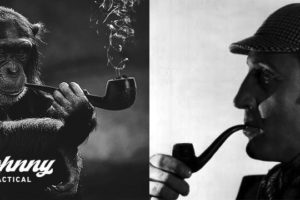I was already super nervous.
The first time I sat in the driver’s seat of a cruiser I thought I had somehow accidentally gotten into the cockpit of a space shuttle. There was so much stuff in there I instantly suffered from sensory overload — the video camera system, MDT, radar, cruiser radio, light bar and siren controls, dome lights, and mounted rifle — I didn’t even know where to begin. My already elevated heart rate spiked, my palms got sweaty, and I could feel the beads of sweat mounting on my forehead.
After walking me through the cruiser checklist in the back parking lot of the station, my Field Training Officer had me get in and buckle up. He got in the other side, sat beside me, and asked me what’s the first thing we were supposed to do. My mind was already spinning out of control and I was quite possibly on the brink of hyperventilating. I was wearing a monkey suit and bat belt for the first time (which was very uncomfortable), sitting in a space ship, and staring with dilated pupils at my first shift as a police officer right in the face. I didn’t have a clue.
In The Beginning
At this point I would be lucky if I could shift the car into drive and this guy was giving me a pop quiz. After hearing the question my sweaty palms released its death grip on the steering wheel and started fidgeting with the crease of my uniform pants. I stammered, ummed-and-ahhed as my eyes searched the fuzzy roof liner for the answer that simply wasn’t there.
This was how my field training began, and though I learned a lot, there were three lessons that stood out the most:
1. First, Coffee
And speaking of space shuttles, this wasn’t rocket science. But in answer to his question of what we do first I think I came up with some sort of what I thought was a textbook answer. “Well, sir, the first thing we ought to do is take these well-pressed uniforms and this shiny cruiser out there into the town, seek out injustice, defend the defenseless, right wrongs, and help old ladies cross the street all while shaking hands and kissing babies.”
No.
The first thing to do, he said, is get coffee — and that’s exactly what we did. At the time, I wasn’t much of a coffee drinker, but I am now. Over the years I have seen the wisdom in making caffeination a priority and it is most definitely the life-blood of the midnight shift. This lesson is also one that I have consistently taught to those I have trained over the years. There are things that can wait, but coffee isn’t one of them.
2. Get On Your Horse
Breaking the rules takes some getting used to, at least it did for me. What I mean by that is when you need to stop a violator or get somewhere Code 3, you have to break the rules of the road. If you don’t, you’ll never catch the bad guy or get wherever it is you need to go in time to be of any use.
While on patrol during FTO we’d spot an expired sticker or ping a speeder on radar driving in the opposite direction. This meant that you had to stop, turn around, and go after them with some catching up to do. In the early days, I was pretty slow at this. Partly because I had to break the rules of the road, and partly because I was driving a space ship. Every time I was too slow in deciding whether or not to stop someone or in turning around to go pull them over, my FTO would always bellow out from the passenger seat, “Get on your horse!” Which meant, as I understood it, “Make a decision you idiot and hurry the heck up, he’s getting away!”
We make a ton of split second decisions in police work. We have to. There’s no time for committee meetings, votes, or to take a poll. And not only do we have to make split second decisions, but we have to then act on those decisions. If we are slow to decide or slow to act, then our decisions become arbitrary, lose effectiveness, or can even put us or someone else in danger. We must be decisive in thought and quick in action — that’s what it means to get on your horse.
3. Cat And Mouse
It’s very discouraging when the bad guy gets away. No one likes to lose, certainly not me. Having a competitive drive is definitely a necessity for being an effective officer — Type-B kind of people don’t fair so well.
One of the things I struggle with is beating myself up over the ones that get away. Whether it’s the suspended plate that somehow eluded me and vanished when I tried to turn around and go stop it, the vehicle and foot pursuits I lost, or the burglary suspects that went unidentified — none of those pills are easy to swallow.
When these things would happen, my FTO would always remind that police work is a game of cat and mouse. Sometimes we win, sometimes they win. So when this happens to you, remember that it’s just part of the game; don’t beat yourself up if you gave it your all. Even the best batters in the history of Major League Baseball never did much better than getting a hit 33% of the time, never mind hitting a home run.
That’s Life
Life is a lot like FTO — you learn on the fly, you deal with stuff you never learned and situations there’s no answer book for, and you are going to make mistakes. These are inevitable truths we often forget in the moment but that we need constant reminders of. If nothing else, remember these three things:
1. First, coffee — a steaming hot cup of comfort, company, and a little boost of energy to get you through the day. It’s all about priorities: put first things first.
2. Get on your horse – make a decision and act on it. You’re not much good if you don’t decide, commit, and follow through.
3. It’s a game of cat and mouse — you can’t win all time, so don’t beat yourself up over a loss. If you’re giving it your best and batting in the neighborhood of .300, you’re doing pretty dang well.
__________________________
– What are your priorities?
– Are you putting first things first?
– Are you too hard on yourself?
– How’s your decision making?
– Do you commit and follow through?
__________________________
Thanks for reading! Do you have a story that you think we could learn from and that you’d like to share with Johnny Tactical nation? Fill out the contact form and include your name, rank, and department, or email it to [email protected] and follow these guidelines:
– It must be a firsthand account
– True
– Have a lesson, principle, or tactic to apply
– Cleaned of names, dates, and places
– Include your call sign
If your story is selected and published in our blog you’ll get the credit using your call sign and we’ll send you a free Johnny Tactical morale patch.




Leave a Reply
Your email is safe with us.
You must be logged in to post a comment.